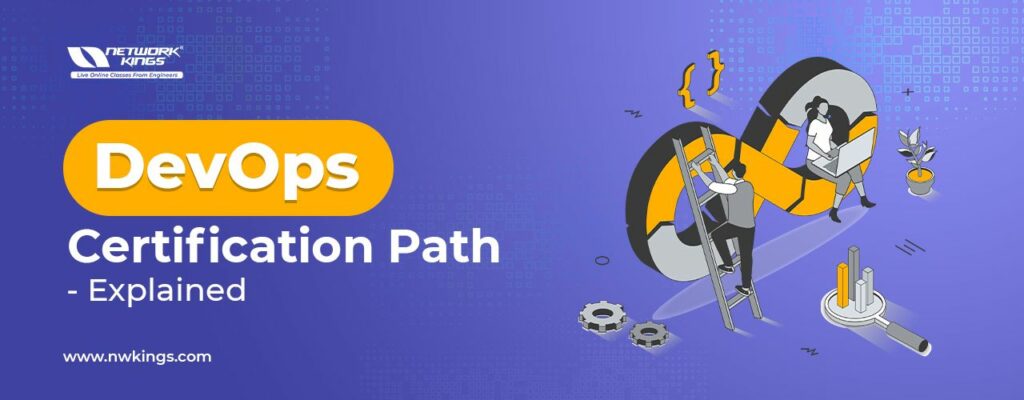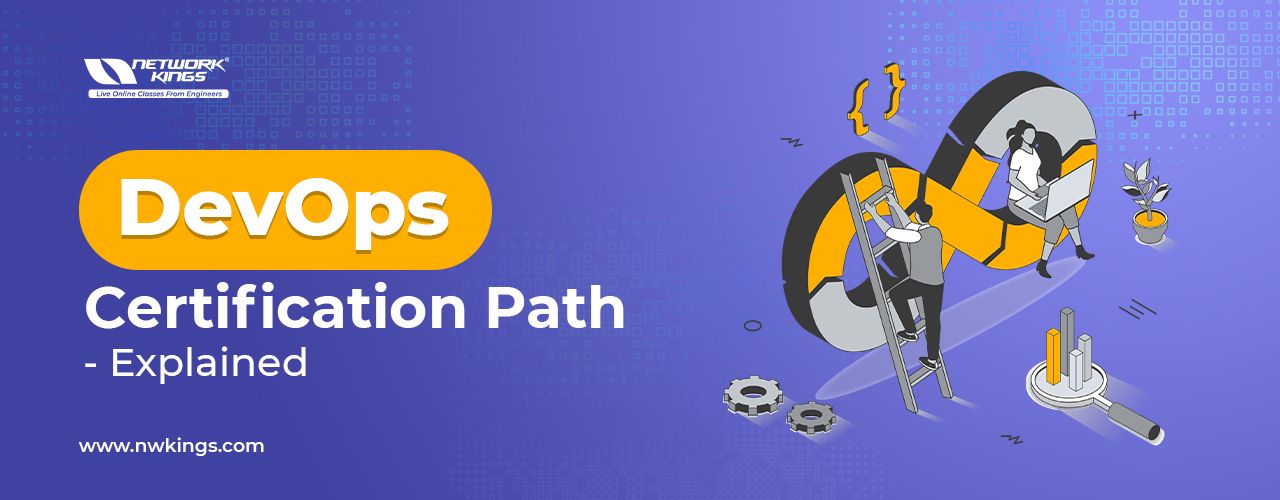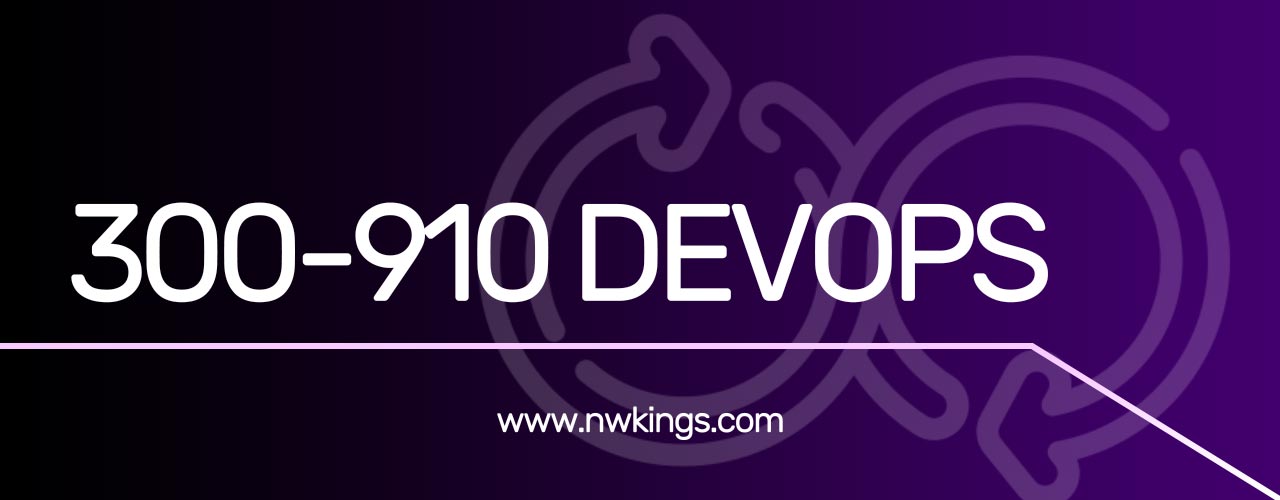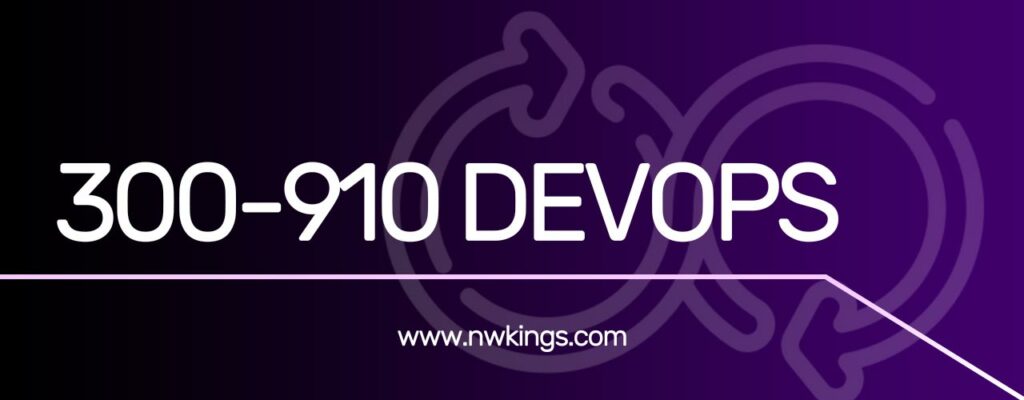
Are you considering a career as a DevOps engineer? It is essential to understand the DevOps certification path. In this blog, we will dive into the structured roadmap that aspiring DevOps professionals can take to improve their skills and progress in their careers. From learning fundamental principles to mastering crucial tools and technologies, we will explore the key milestones.
Whether you are new to DevOps or aiming to enhance your expertise, this guide will offer valuable insights into the certification journey. It is designed to empower you to confidently navigate the dynamic world of DevOps.
Who is a DevOps engineer?
A DevOps engineer is someone who works in the field of IT and specializes in bringing together software development and IT operations. They are all about making sure that these two sides work together smoothly to deliver top-notch software.
These engineers have a mix of technical skills. They are good at things like coding, managing systems, and handling infrastructure. They know their way around scripting languages, tools for managing configurations, and various automation frameworks. They’re also well-versed in cloud platforms, containerization (like Docker), and orchestration tools (such as Kubernetes).
Their main job is to make the process of getting new software out the door faster and smoother. They do this by setting up systems that automatically test code, integrate new changes, and deliver updates to users without a hitch.
They are also the ones keeping an eye on things once the software is up and running. They monitor performance, fix any issues that come up, and make sure everything stays safe and secure.
What is the significance of DevOps?
DevOps is a game-changer in the world of software development and IT operations. It is all about bringing teams together to work smarter, not harder. Here is why it is so important-
- Better Teamwork: DevOps breaks down barriers between development and operations teams. This means everyone works together seamlessly, sharing ideas and feedback to make software better.
- Faster Updates: By automating tasks and using continuous integration and delivery, DevOps makes it quick and easy to roll out new software features. That means companies can keep up with the competition and give users what they want when they want it.
- Higher Quality: DevOps puts a big emphasis on testing and catching problems early. This results in software that is more reliable and has fewer bugs, keeping users happy.
- Adaptability: DevOps lets companies scale up their operations smoothly, adapting to changes in demand without missing a beat. This flexibility is crucial in today’s fast-paced tech world.
- Reduced Risk: DevOps encourages trying out new ideas while minimizing the chance of things going wrong. By breaking projects into manageable chunks and using smart techniques, teams can keep risks low and recover quickly if something goes awry.
- Business Agility: Ultimately, DevOps helps companies stay nimble and responsive to what users need. This agility is key to staying ahead of the curve and thriving in a competitive market.
Why DevOps certifications are valuable in the tech industry?
DevOps certifications are highly valued in the tech industry for various reasons:
- Expertise Validation: Certifications confirm a professional’s expertise in DevOps principles, tools, and methodologies, showcasing their ability to implement DevOps practices effectively.
- Career Growth: Holding DevOps certifications can boost career prospects, leading to opportunities for higher-level roles. Employers often seek certified individuals to spearhead DevOps initiatives and drive organizational change.
- Industry Reputation: DevOps certifications carry industry-wide recognition and respect, providing a standardized measure of competency for employers to assess candidates consistently.
- Competitive Edge: In a competitive job market, DevOps certifications differentiate individuals and make them more appealing to recruiters, increasing their chances of securing DevOps roles.
- Credibility: Certifications from reputable DevOps organizations enhance an individual’s credibility and reputation, signaling a commitment to continuous learning and professional development.
- Skills Validation: DevOps certifications validate specific skills crucial for DevOps roles, such as continuous integration, automation, and cloud computing, instilling confidence in employers regarding a candidate’s capabilities.
- Professional Development: Pursuing DevOps certifications reflects a dedication to ongoing learning and growth. Certified professionals often stay updated with the latest industry trends and best practices, contributing to their professional development.
What are the core DevOps principles?
DevOps revolves around some fundamental principles aimed at making software development and deployment smoother while fostering teamwork, innovation, and ongoing improvement. Here is a breakdown of these core principles:
- Teamwork: DevOps encourages breaking down barriers between different teams like development, operations, and QA/testing to promote collaboration and shared goals, ensuring better communication and teamwork at every stage of the software development process.
- Automation: By automating routine tasks such as code building, testing, deployment, and infrastructure management, DevOps improves efficiency and reliability, minimizing errors and freeing up time for more strategic work.
- Continuous Integration (CI): CI involves frequently integrating code changes into a common repository, ideally multiple times a day. This ensures early detection of integration issues through automated testing, maintaining the software in a deployable state continuously.
- Continuous Delivery (CD) / Continuous Deployment (CD): CD focuses on swiftly and reliably releasing software into production whenever needed. The CD takes it further by automatically deploying every change that passes through the CI pipeline. Both approaches rely on automation and rigorous testing to uphold software quality standards.
- Infrastructure as Code (IaC): IaC manages and provisions infrastructure using code and automation tools, treating infrastructure as software. This allows for consistent environments across different stages and ensures scalability and reliability.
- Monitoring and Feedback: DevOps emphasizes continuous monitoring of applications and infrastructure to gather insights into their performance, availability, and user experience. This feedback loop aids in identifying issues, optimizing processes, and making data-driven decisions for improvement.
- Continuous Improvement: DevOps nurtures a culture of ongoing learning and enhancement. Teams regularly reflect on their processes, gather feedback, and iteratively implement changes to improve efficiency, reliability, and quality.
What are the benefits of DevOps Certification?
DevOps certifications bring a host of advantages to both individuals and tech organizations. Here, are the Benefits of DevOps Certification:
- Skill Enhancement: By pursuing DevOps certification, professionals gain a deep understanding and practical skills in DevOps principles, tools, and methods. This knowledge equips them to effectively implement DevOps practices within their teams.
- Career Growth: DevOps certifications unlock doors to higher-level positions within organizations. Certified professionals are often sought after to lead DevOps projects, drive organizational change, and assume leadership roles in DevOps teams.
- Industry Recognition: DevOps certifications are highly regarded across the tech industry, serving as a recognized standard of competency. Holding a DevOps certification signals a commitment to excellence and expertise in DevOps practices, enhancing credibility within the industry.
- Competitive Advantage: In a competitive job market, DevOps certifications set individuals apart from their peers, making them more appealing to potential employers. Certified professionals are in high demand for DevOps roles, increasing their chances of securing rewarding career opportunities.
- Higher Earning Potential: DevOps certifications often translate to higher salaries and access to more lucrative job opportunities. Certified individuals are valued for their expertise and are well-compensated for their contributions to organizations.
- Validation of Skills: DevOps certifications validate specific skills relevant to DevOps roles, such as automation, cloud computing, and infrastructure as code. This validation assures employers of an individual’s ability to effectively contribute to DevOps initiatives.
- Networking Opportunities: Pursuing a DevOps certification provides avenues for networking with industry professionals, experts, and peers. Engaging with a community of certified DevOps practitioners facilitates knowledge exchange, best practices sharing, and staying updated with industry trends.
- Continuous Learning: DevOps certifications foster a culture of continuous learning and professional development. Certified professionals engage in ongoing education and training, staying abreast of emerging technologies and practices, and advancing their careers accordingly.
Discuss the DevOps certification path in detail - Roadmap.
Forming a career in DevOps entails a blend of education, hands-on experience, and ongoing learning. Here is the detailed DevOps certification path to guide you to becoming a DevOps engineer:
- Grasp DevOps Principles and Practices
Begin by understanding the fundamentals of DevOps principles, practices, and methodologies. Get acquainted with concepts like continuous integration, continuous delivery/deployment, infrastructure as code, automation, and collaboration between development and operations teams.
- Master Essential Tools and Technologies
Familiarize yourself with the key DevOps tools and technologies used for automation, orchestration, version control, monitoring, and deployment. Examples include Git, Jenkins, Docker, Kubernetes, Ansible, Terraform, and monitoring tools like Prometheus and Grafana.
- Develop Programming and Scripting Skills
Build proficiency in programming languages commonly used in DevOps, such as Python, Ruby, or Shell scripting. Understanding programming concepts and scripting languages is essential for automating tasks and writing infrastructure as code.
- Gain Practical Experience
Acquire hands-on experience by working on real-world projects or contributing to open-source initiatives. Set up your development environment, practice automation techniques, and experiment with various tools and technologies to gain practical insights.
- Commit to Continuous Learning
DevOps is a dynamic field, so dedicate yourself to continuous learning and professional development. Stay updated with the latest trends, tools, and best practices by attending conferences, webinars, workshops, and online courses. Follow industry experts, blogs, and forums to stay informed about emerging technologies.
- Engage and Network
Engage with the DevOps community by attending meetups, participating in online forums, and networking with fellow professionals. Collaborating and sharing knowledge with peers can offer valuable insights and growth opportunities.
- Develop Soft Skills
Cultivate soft skills such as communication, collaboration, problem-solving, and adaptability. Strong interpersonal skills are crucial for success as a DevOps engineer, as you will frequently interact with developers, operations teams, and other stakeholders.
- Explore Career Opportunities
Begin applying for DevOps engineer roles or positions involving DevOps practices in organizations. Highlight your skills, certifications, and relevant experience on your resume and during interviews to showcase your suitability for the role.
Where can I learn the best DevOps course?
To learn the best DevOps course, you can choose Network Kings. Being one of the best ed-tech platforms, you will get to enjoy the following perks-
- Learn directly from expert engineers
- 24*7 lab access
- Pre-recorded sessions
- Live doubt-clearance sessions
- Completion certificate
- Flexible learning hours
- And much more.
The DevOps training here includes the following-
What are the job opportunities for a DevOps certified?
The top available job opportunities for a DevOps certified are as follows-
- DevOps Engineer
- Cloud Engineer
- Site Reliability Engineer
- Automation Engineer
- Security Engineer
- DevOps Manager
- Release Engineer
- Infrastructure Engineer
- Continuous Integration/Continuous Deployment
- (CI/CD) Engineer
- Kubernetes Administrator
- Platform Engineer
- Docker Engineer
- Build Engineer
- Systems Engineer
- Network Engineer
- Database Administrator
- IT Operations Manager
- Software Development Manager
- Technical Project Manager
- Solution Architect
What are the salary aspects for a DevOps certified?
The estimated salary aspects for a DevOps certified in different countries are as follows-
- United States: USD 90,000 – USD 150,000 per year
- Canada: CAD 80,000 – CAD 120,000 per year
- United Kingdom: GBP 50,000 – GBP 80,000 per year
- Germany: EUR 50,000 – EUR 90,000 per year
- France: EUR 45,000 – EUR 75,000 per year
- Australia: AUD 90,000 – AUD 140,000 per year
- Singapore: SGD 70,000 – SGD 120,000 per year
- India: INR 6,00,000 – INR 18,00,000 per year
- United Arab Emirates: AED 180,000 – AED 300,000 per year
- Brazil: BRL 90,000 – BRL 150,000 per year
- South Africa: ZAR 300,000 – ZAR 600,000 per year
- Japan: JPY 6,000,000 – JPY 12,000,000 per year
- China: CNY 250,000 – CNY 500,000 per year
- Russia: RUB 2,000,000 – RUB 4,000,000 per year
- Mexico: MXN 500,000 – MXN 900,000 per year
Wrapping Up!
Grab this chance to upgrade and become a top-notch DevOps engineer expert by following the given DevOps certification path. If you are looking to learn the prominent DevOps engineer roles and responsibilities, consider enrolling in our DevOps Master Program today. Should you have any questions or require assistance, please do not hesitate to reach out to us through the comment section. Your queries are welcome, and we are here to help!
Happy Learning!




